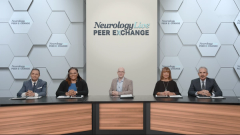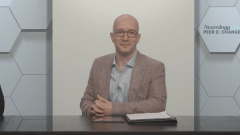
Discontinuation of Treatment for Pregnancy in Multiple Sclerosis
An expert panel considers patients with multiple sclerosis who may need to discontinue treatment during pregnancy.
Episodes in this series

Stephen Krieger, MD: We talked a bit about family planning earlier, particularly with respect to the teriflunomide vs ponesimod efficacy. But maybe we can talk about our experiences stopping medicine so that someone could get pregnant, and how that influences our strategy. If any of you have seen some of the presentations here at ECTRIMS [European Committee for Treatment and Research in Multiple Sclerosis] annual meeting that looked at stopping S1Ps [sphingosine-1-phosphate receptor modulators] for pregnancy, we could comment on that, too. Dr Hughes, do you want to talk about holding medicine for family planning and how you counsel your patients?
Bruce Hughes, MD: Sure. That’s always a tricky subject. I think it has to do, first and foremost, with whether they have stable disease or whether they have unstable disease, and you want them to get stabilized before attempting to conceive. I think that’s very important. And then once we have stable disease, the discussion on timing. I think, with the newer oral agents, I refer a lot to the pregnancy registries that have captured hundreds of patients with MS [multiple sclerosis] who have become pregnant on agents and have not had particular big issues with regard to either malformation or with having spontaneous miscarriages. So, I think the discussion is finding that sweet spot, where we don’t have as much on the safety concern side of things, but still, we want them not to have disease reactivation timing. That’s where with the 1-week elimination with regard to ponesimod, it has that agility to be used in that setting with fertile patients, and having that discussion as to when they can start becoming or actively attempting to conceive.
Stephen Krieger, MD: Perfect. Dr Crayton, does this align with your approach and what you’re telling patients, or do you have other strategies that you build on that?
Heidi Crayton, MD: I totally agree. I practice very similar to Bruce’s way in terms of counseling our young ladies or women who want to become pregnant. There have been a couple of changes in my practice over the years, most noticeably with natalizumab, where I don’t feel the need to do a long-term washout. It’s nice to have agility in terms of our medication strategies and advising this population, whether we need a certain amount of time that we need to wash out, or whether we can say, “Continue this medication until you actually conceive, and then we can stop.”
Then we also get into the hurdle sometimes, or the uncharted waters of women who have to go through heroics to conceive, who might have prolonged periods of time off of medication, waiting to conceive, or trying to conceive. I think we’ve learned from probably some negative events, women are active during this time. They have relapses, they have disease activity that prolonged time off of DMT [disease-modifying therapy] put them at risk for. I think it’s about navigating both of those elements.
Stephen Krieger, MD: I think you’re right, and there was some work shown here at ECTRIMS that touches on that. This was a paper by colleagues looking at fingolimod, in particular, being used up until conception or stopping it beforehand. Generally speaking, we don’t want people to stay on this drug while they’re conceived, but things happen. They did find a pretty substantial amount of disease activity, to your point, in that pre-pregnancy period or even during pregnancy. Which, pregnancy is protective against MS relapse, but it’s probably not as good as our current generation therapies. And so, when we pull them away, in the case of fingolimod here, some of that disease activity occurred. Dr Williams, any additional thoughts about family planning considerations or work you’ve seen here at ECTRIMS about that?
Mitzi Williams, MD: Yes, I think the paper you just mentioned was very interesting because you wonder if that’s related to rebound, and if we would see those same results with our newer generation S1Ps. I think that pregnancy is extremely important, and I’m very excited to see so much data surrounding pregnancy because these papers and these data will really help to inform how we treat our patients. I used to routinely take everybody off therapy and maybe pulse them with steroids every month until they conceived. But having more information about being able to treat at least until conception, or what happens if someone’s on therapy, and we find out they’ve conceived already. I think these are very important data, and breastfeeding data as well, to help us understand how to navigate this for our patients. We want them to maintain as much function as possible so they can take care of those children that they’re having.
Stephen Krieger, MD: Dr Bandari, to close out this topic with you, if you’ve had a patient who’s had disease activity, do you have a preferred way of trying to treat them when they wish to conceive? Are there alternatives that you might use to try to keep their disease under control?
Daniel Bandari, MD, MS: That’s a very good question. Among everything else in treating MS, probably one of the biggest unmet needs was the knowledge about what are we going to do with the patients when they are planning to get pregnant, or they are pregnant. And as you mentioned, our gunshot approach has always been to stop the medication even before they consider conceiving. But there is what I would like to call the spectrum of agility…in the sense that not everybody falls into the same category. So when treating highly active patients, in my opinion, we’d really need to focus on their disease more than anything else at the beginning since you do want to control that disease right off the bat.
One of the main questions I ask patients who may consider pregnancy, even before they start their first line of therapy is, “When are you planning to have a family?” If I get an idea that within the next 2 to 3 years, they want to start having children, then I plan it properly. I try to plan it properly. I put them on something that controls the disease so well that would give me that confidence that I am able to at some point hold their medication while they’re getting pregnant, because of everything else you mentioned that we know.
Pregnancy is protective, and we have seen that in more than 89% of the patients in our long-term study we did. And we monitor them based on hormonal factors and multiple other elements in the picture. There are cases in which I had to make the hard decision of keeping a patient on a disease-modifying therapy. Why? Because they got pregnant, and I knew that during prepartum, peripartum and postpartum, they were going to have issues. Those are rare cases; however, I had to make that decision, and I have kept a patient on disease-modifying therapy, and I watched them very closely. And from what I can tell, they all have done well, and they had beautiful babies.
Stephen Krieger, MD: This is good.
Daniel Bandari, MD, MS: Which is a great thing. It’s not a decision that in my opinion uniformly will be taken. So, it’s those unique cases. But for all intents and purposes, my recommendation has always been we need to stop disease-modifying therapy in order to make sure we reduce the risk to the unborn fetus.
Stephen Krieger, MD: That’s fair.
Mitzi Williams, MD: I’d like to add one more thing. I think another area where we still need more research is when to restart therapy postpartum and the effects of our medications on breast milk. I did see a presentation where they were talking about low concentrations of a B-cell depleter in breast milk. And so, because breastfeeding is very much encouraged, I have some patients who want to maybe breastfeed for 6 months or a year, and we know that there may be some protection when people are exclusively breastfeeding, which is usually not for 6 months to a year. I think that we definitely need more data in that regard as to when to restart and how safe are these therapies after the baby is born but while they’re breastfeeding.
Stephen Krieger, MD: Yes, that speaks to the need for these registries that Dr Hughes, you spoke about. There can be registries both for pregnancy outcomes as well as for things like lactation safety and studies that look at that. You mentioned B-cell depletion, which I think has been very useful for us in family planning conversations with, particularly patients with high disease activity for whom we want to try to shut that down as best as possible before they start to try to conceive. One strategy we’ve talked about a lot here is using a modern, safe oral medicine right up until conception. Another strategy is to use a B-cell depleter, bring down B cells, and offer that patient at least a few months to try to conceive while the drug is less present in the system.
With breastfeeding, I think you’re right. We have a paucity of data. Work by Riley Bove, MD, from UCSF [University of California San Francisco] has looked at ocrelizumab in breast milk and found very low concentrations. I also tend to think about, and this is just my own approach; this is not a data-driven statement I’m going to make. But if a medicine is designed to be given by mouth, if it’s an oral agent that’s going to be biologically active when swallowed, I’m more concerned about that in breast milk than, for instance, a monoclonal antibody, which is not designed to be biologically active when taken by mouth. We can’t drink our monoclonals and think they’re going to work. So, if a baby gets a bit of a monoclonal antibody that’s expressed in breast milk, I think the likelihood it’ll be biologically active is very small. That’s my non–data-driven, but at least mechanistically driven, thought. Do you have thoughts about this?
Heidi Crayton, MD: I totally agree.
Bruce Hughes, MD: Agreed.
Mitzi Williams, MD: Yes.
Daniel Bandari, MD, MS: It’s very intriguing and interesting, but I absolutely have to say, from the biological aspects of it, it’s highly likely plausible. Absolutely, yes.
Stephen Krieger, MD: Well, as my mentors, though, have pointed out, just because it makes biological sense doesn’t mean it will turn out to be true.
Daniel Bandari, MD, MS: It doesn’t.
Mitzi Williams, MD: This is true.
Stephen Krieger, MD: Trust me. So, we stay humble.
Transcript edited for clarity
Newsletter
Keep your finger on the pulse of neurology—subscribe to NeurologyLive for expert interviews, new data, and breakthrough treatment updates.














